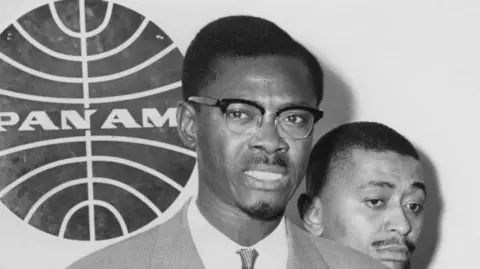Belgian prosecutor seeks to try ex-diplomat over Congolese hero's killing
 Pictorial Parade/Getty Images
Pictorial Parade/Getty ImagesBelgian prosecutors say they are seeking to put on trial a 92-year-old former diplomat over his alleged role in the 1961 killing of Congolese independence hero Patrice Lumumba.
Etienne Davignon is accused of involvement in the "unlawful detention and transfer" of Lumumba and his "humiliating and degrading treatment", the prosecutor's office said. He has not yet commented but has previously denied wrongdoing.
Lumumba's children filed a case in Belgium in 2011 to demand justice after their father was killed aged 35.
He was shot dead by a firing squad with the tacit backing of Belgium, the former colonial power in the vast mineral-rich African state now known as the Democratic Republic of Congo.
His body was dissolved in acid, but a gold-crowned tooth remained. It was handed over to Lumumba's family by the Belgian authorities in 2022.
A Belgian parliamentary commission of enquiry concluded in 2001 that Belgium bore "moral responsibility" for the assassination, and the government issued an apology a year later to Lumumba's family and the Congolese nation.
Davignon is the sole survivor among 10 Belgians accused of complicity in Lumumba's murder, according to AFP news agency.
He was a trainee diplomat at the time of the assassination, and served as the vice-chairman of the European Commission in the 1980s.
A magistrate would decide if he should be put on trial, with a hearing set for January 2026.
Lumumba's daughter, Juliana, welcomed the development, telling Belgian broadcaster RTBF: "We're moving in the right direction. What we're seeking is, first and foremost, the truth."
Lumumba became prime minister at the time of Congo's independence in 1960, but the nation plunged into turmoil soon thereafter.
He was later dismissed from the post, and executed by a firing squad, with both Belgium and the US accused of being complicit in his killing.
His body was then buried in a shallow grave, dug up, transported 200km (125 miles), interred again, exhumed and then hacked to pieces and finally dissolved in acid.
Belgian police commissioner Gerard Soete, who oversaw and participated in the destruction of the remains, took the gold-crowned tooth.
He later admitted this, and talked about a second tooth and two of the corpse's fingers, but these have not been found.
Lumumba's journey from prime minister to victim of assassination took less than seven months.
Shortly after independence, the country was hit by a secessionist crisis as the mineral-rich south-eastern Katanga province declared that it was splitting off from the rest of the country.
In the political chaos that followed, Belgian troops were sent in on the grounds that they would protect Belgian nationals, but they also helped support the Katangan administration, which was seen as more sympathetic.
Army chief of staff Col Joseph Mobutu seized power, just over a week after Lumumba's dismissal as prime minister by the president.
Lumumba was then placed under house arrest, escaped and re-arrested in December 1960, before being held in the west of the country.
His presence there was seen as a possible source of instability and the Belgian government encouraged his transfer to Katanga.
During the flight there on 16 January 1961 he was assaulted. He was also beaten on arrival as the Katangan leaders pondered what to do with him.
Eventually it was decided that he would face a firing squad, and on 17 January he was shot, along with two allies.
You may also be interested in:
 Getty Images/BBC
Getty Images/BBCGo to BBCAfrica.com for more news from the African continent.
Follow us on Twitter @BBCAfrica, on Facebook at BBC Africa or on Instagram at bbcafrica
